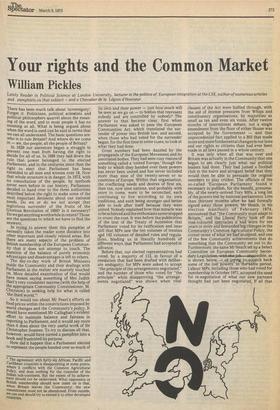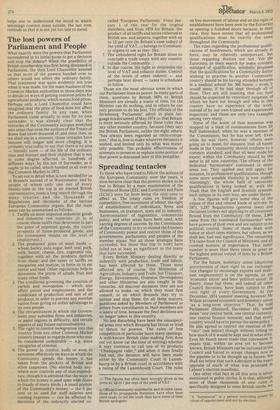Your rights and the Common Market
William Pickles
Lately Reader in Political Science at London University, lecturer in the politics of :European integration at the LSE, author of numerous articles and pamphlets on that subject and a Chevalier de la Legion d'Honneur.
'There has been much talk about 'sovereignty'. Forget it. Politicians, political scientists and Political philosophers quarrel about the mean ing of the word, and to most people it has no meaning at all. What is being argued about when the word is used can be said in terms that we can all understand. The basic questions are: Who is to rule Britain? And where do we come in — we, the people, all the people of Britain? In 1629 our ancestors began a struggle to Prevent one man from having the right to decide for all of us. In 1688 they laid down the rule that power belonged to the elected . Parliament, and in the centuries since then the right to elect that Parliament has been.
extended to all men and women over 18. Now that whole structure is in danger. In 1972, with no consultation of the people, by methods never seen before in our history, Parliament decided to hand over to the three authorities described below the right to make some of the most important decisions about our national needs. Do we or do we not accept that inglorious surrender of the fruits of the Glorious Revolution of 1688? Is it necessary? Do we get anything worthwhile in return? Those are the questions to which we have to find the answers.
In trying to answer them this pamphlet of necessity takes the reader some distance into Other important and closely related areas. But there are many aspects of the problem of British membership of the European Commun ity that it does not attempt to touch. The question of the balance of purely economic advantages and disadvantages is left to others. • The day-to-day work of British Ministers inside the Community and their dealings with Parliament in the matter are scarcely touched on. More detailed examination of that would have meant saying something of Mrs Judith Hart's very consistent success (with the help of the appropriate Community Commissioner, M. Cheysson) in seeking help for what is called the third world.'* So it would too about Mr Peart's efforts on food prices within the constrictions imposed by world changes and the Community's policy. It would have mentioned Mr Callaghan's evident effort to maintain balance and fairness in 'reporting to Parliament, and it would say more than it does about the very useful work of Sir Christopher Soames. To try to discuss all that, however, would have turned a pamphlet into a book and frustrated its purpose. How did it happen that a Parliament elected to represent the people handed over so much of
its own and their power — just how much will be seen as we go on — to bodies that represent nobody and are controlled by nobody? The answer to that became clear, first when Parliament was asked to pass the European Communities Act, which translated the surrender of power into British law, and second, when those who had voted for the surrender began, for the first time in some cases, to look at what they had done.
Great numbers had been dazzled by the propaganda of the European Movement and its associated bodies. They had seen rosy visions of something called a 'united Europe,' though the body to which they handed over their powers has never been united and has never included more than nine of the twenty-seven or so countries of Europe. Within that organisation, the conflicting needs and desires of first six, then ten, now nine nations, and probably with more to come, were to be reconciled, each continuing to live according to its own traditions, and each being stronger and better able to look after itself because they were united. Nobody explained how that miracle was to be achieved and the enthusiasts never stopped to count the cost. It was before the publication of the text of the Treaty of Accession that Parliament voted for its ratification and later still that MPs saw the ten volumes of treaties apd 142 volumes of detailed rules and regulations, binding us in literally hundreds of 'different ways, that Parliament had accepted in ad'vance.
Before that, our elected representatives had voted, by a majority of 112, in favour of a resolution that had been drafted with deliberate ambiguity; for MPs were asked to accept "the principle of the arrangements negotiated," • and the number of those who voted for "the principle" while disapproving "the arrangements negotiated" was shown when vital
clauses of the Act were bullied through, with the aid of intense pressures from Whips and, constituency organisations, by majorities as small as ten and even six votes. After twelve months of intermittent debate, not a single amendment from the floor of either House was accepted by the Government — and that unprecedented fact applied to a Bill that made more and more fundamental changes in our laws and our rights as citizens than had ever been made in all laws passed in a whole century.
It was only when all that was over and Britain was actually in the Community that one began to see clearly just what our political leaders had done. They had joined a football club in the naive and arrogant belief that they would then be able to persuade the original members to play cricket. The officials of the so-called 'European Parliament' found it necessary to publish, for the benefit, presumably, of the newly-arrived Tory MPs, a long list of the powers lost by national parliaments. Less than thirteen months after he had formally signed away those powers, Mr Heath, in his election manifesto of February 1974, announced that "the Community must adapt to Britain," and the Liberal Party took off the rose-coloured spectacles it had worn for ten years or more and demanded big changes in the Community's Common Agricultural Policy, the corner-stone of what we had accepted, and one of the few Community achievements that do something that the Community set out to do. Furthermore, the same Mr Heath set up a Select Committee on European Community Secondary Legislationrwithvaisatiellift,laspossible, as is shown below -= pociatch back some of the lost pOwei'S. In the-satne period, Labour MPs, including those who had voted for membership in October 1971, accepted the need for re-negotiation of what our new partners thought had just been negotiated. If all that
helps one to understand the mood in which lemmings commit mass suicide, the last item reminds us that it is not yet too late to mend.











































 Previous page
Previous page